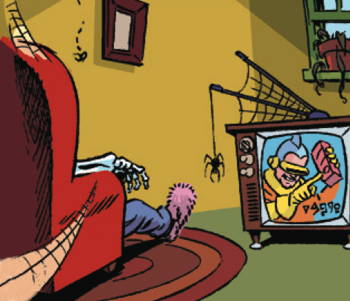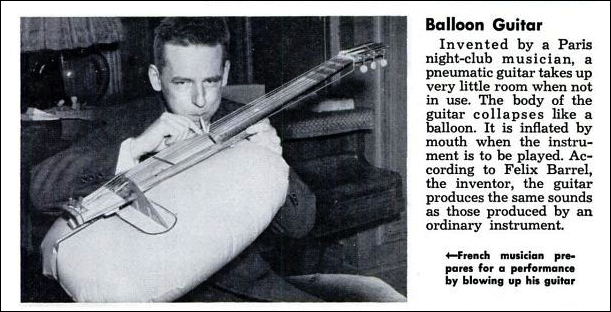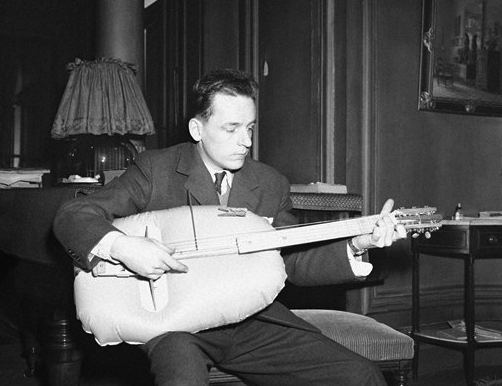September 2021
September 25, 2021
Felix Barrel’s Pneumatic Guitar
I originally posted this back in Oct 2012, but I was recently contacted by Matt Nolan who informed me that the info in the post wasn't entirely accurate. 'Felix Barrel' was actually the tongue-in-cheek stage name of François Baschet, who was granted both a French and US patent for his invention. Also, he invented it in 1952, not 1955.The picture of Baschet with his guitar can be found on the website of the Baschet Association, which explains that its invention was just the start of Baschet's long career as a creator of unusual instruments, particularly ones that involved "folding metal sheets into geometric shapes".
Thanks to Matt for the info!
Back in
Posted By: Alex - Sat Sep 25, 2021 -
Comments (8)
Category: Music, Patents, 1950s
The Stunts of TRUTH OR CONSEQUENCES Radio Show
Many folks of a certain age might recall TRUTH OR CONSEQUENCES as a TV show. But it began on radio in 1940, and was known for its far-out stunts, as detailed on this page.Excerpt below.
A 1942 contestant told Edwards that her 17 year old son was serving in the Marines - as if Edwards didn’t know this in advance when she was “randomly” selected to appear on the show. Her consequence was to count pennies - pennies mailed to her home by listeners to buy War Bonds for her son. Broadcasting magazine reported within a week that the woman received 301,464 coins, mostly pennies, totaling over $3,100. Variety reported that after ten days the amount of mail had reached 236,000 pieces and the amount was $3,560. To handle the massive amount of mail Edwards temporarily rented office space and hired 200 clerks to pick it up, open it, count the money and track the postmarks to learn where it came from, valuable research for NBC and sponsor Procter & Gamble.
Edwards sent a 1944 contestant on an involved and hilarious search for a thousand dollars that climaxed after a month with listeners mailing 18,000 old books to the man‘s home which were donated to servicemen and veterans’ hospitals - after the contestant was directed to leaf through the books to find the missing half of a thousand dollar bill sent to him by the show.
The fact that they gave out big money prizes didn't hurt their popularity either.
Source: Lancaster New Era (Lancaster, Pennsylvania) 08 Dec 1947, Mon Page 3
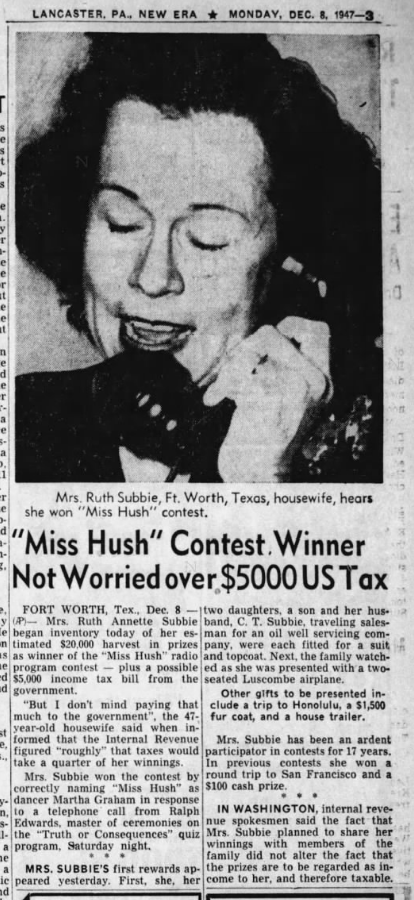
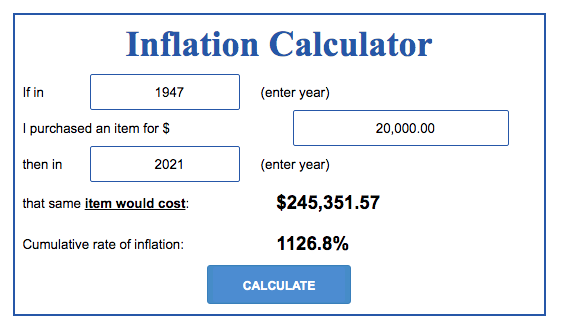
Posted By: Paul - Sat Sep 25, 2021 -
Comments (1)
Category: Money, Publicity Stunts, Radio, 1940s
September 24, 2021
Robber warns of robbery
Jan 1995: Raymond Cuthbert warned an employee at Nolan's Pharmacy that he would be back in half an hour to rob the store. Sure enough, he returned a half hour later with a friend who was carrying a concealed weapon. The two were arrested by the waiting police.
The Vernon Morning Star - Jan 6, 1995
Perhaps Raymond had in mind the law proposed in Texas in 1973 that would have required criminals to give their victims advance notice before committing a crime.
Posted By: Alex - Fri Sep 24, 2021 -
Comments (0)
Category: Stupid Criminals, 1990s
Naked Viniculture
Safe for work (just bums) video here.
Posted By: Paul - Fri Sep 24, 2021 -
Comments (1)
Category: Agriculture, Nudism and Nudists, Europe
September 23, 2021
King Gustav III’s Coffee Experiment
According to what may be legend, King Gustav III of Sweden conducted that country's first clinical trial during the second half of the 18th century. He wanted to determine whether drinking coffee was bad for one's health. He firmly believed it was. The story is told on the website of Sweden's Uppsala University Library:
Barstow Desert Dispatch - Jan 7, 1991
Wikipedia notes that the authenticity of the coffee experiment story has been questioned. Though it doesn't say why.
As far as I can tell, the earliest English-language reference to the story appeared in a 1937 issue of The Science News-Letter. This account was then widely reprinted in newspapers (see below).
The Science News-Letter attributed the information to the Swedish-born botanist Bror Eric Dahlgren, who was a curator at the Field Museum in Chicago. Dahlgren did author a 1938 pamphlet about the history of coffee, which you can read online at the Biodiversity Heritage Library, but it doesn't include the story of King Gustav. I can't locate where else Dahlgren might have told the story of the coffee experiment, which makes it impossible to check his references.

The Sheboygan Press - May 28, 1938
Posted By: Alex - Thu Sep 23, 2021 -
Comments (5)
Category: Experiments, Coffee and other Legal Stimulants, Eighteenth Century
Japanese Encoffiner Contest 2016
I had no more luck than Alex in searching for "Miss Metallic Casket." But I did find a Japanese competition for "encoffiners."
Posted By: Paul - Thu Sep 23, 2021 -
Comments (3)
Category: Body, Contests, Races and Other Competitions, Conventions, Death, Asia
September 22, 2021
Yes, It’s True!
Really! It's true! It wasn't just a fantastical rumor! Metallic caskets are available again!
Springfield Daily News - Apr 14, 1946
Incidentally, I came across this ad after reading a 1948 article by columnist Doris Lockerman in which she wrote that, "It was reported, but not confirmed, that a convention of morticians once crowned a Miss Metallic Casket."
This led me to a long, and ultimately fruitless, search for any evidence of a 'Miss Metallic Casket'. The above ad was the only minor curiosity related to metallic caskets that I came across.
I'm wondering if the rumor of a 'Miss Metallic Casket' may somehow have been inspired by the pin-up girl calendar that a mortuary released in 1948, which caused a bit of a scandal.
Posted By: Alex - Wed Sep 22, 2021 -
Comments (2)
Category: Death, Advertising, 1940s
Giant Crab, “E.S.P.”
The Wikipedia page.
Posted By: Paul - Wed Sep 22, 2021 -
Comments (4)
Category: Music, Supernatural, Occult, Paranormal, Bohemians, Beatniks, Hippies and Slackers, Psychedelic, 1960s
September 21, 2021
You’re never alone with a Strand
The 1959 "Lonely Man" TV ad for Strand cigarettes is rumored to be the greatest advertising flop in UK history. Because it seemed to say, "If you smoke our cigarettes, you may become a lonely sad sack wandering the streets at night."Rob Gray has some analysis of the failed commercial in his book Great Brand Blunders:
The style of the protagonist and soundtrack to the commercial appealed to the public. Once it went on air people began getting in touch to find out if the theme tune was available to buy as a record. Sensing an opportunity, Cliff Adams and His Orchestra booked some recording studio time and laid down the track, The Lonely Man Theme, for release as a single. In 1960 The Lonely Man Theme broke into the Top 40...
Undeniably, the advertising campaign earned Strand tremendous recognition. As Winston Fletcher writes in his book Powers of Persuasion: The Inside Story of British Advertising 1951-2000, 'Public awareness of the brand and its advertising rocketed to over 90% within weeks. This was unprecedented and has rarely if ever been surpasssed.' It was a brilliant achievement, but one with a fatal flaw. Despite the high awareness levels delivered by the campaign, hardly anyone was buying the product.
The reasons why revolved around how the Lonely Man was perceived. Many viewers found the focus on loneliness uncomfortable. If the man was reliant on a packet of smokes for company, did this mean he was a bit of an oddball unable to sustain friendships? Was he an addictive personality, craving nicotine above human company? Could he be on his own because of a failed relationship or even due to bereavement? Might he be depressed?...
trying to position a new tobacco brand around loneliness — rather than something much more positive and aspirational, such as individuality — was doomed to failure. With sales failing to take off despite the high level of standout the advertising achieved, Strand was soon withdrawn from the market.
Posted By: Alex - Tue Sep 21, 2021 -
Comments (2)
Category: Music, Advertising, Smoking and Tobacco, 1950s
Fanta Pomelo Ad and Sequel
Posted By: Paul - Tue Sep 21, 2021 -
Comments (0)
Category: Aliens, Humor, Science, Advertising, Twenty-first Century
| Get WU Posts by Email | |
|---|---|

| Who We Are |
|---|
| Alex Boese Alex is the creator and curator of the Museum of Hoaxes. He's also the author of various weird, non-fiction books such as Elephants on Acid. Paul Di Filippo Paul has been paid to put weird ideas into fictional form for over thirty years, in his career as a noted science fiction writer. He has recently begun blogging on many curious topics with three fellow writers at The Inferior 4+1. Chuck Shepherd Chuck is the purveyor of News of the Weird, the syndicated column which for decades has set the gold-standard for reporting on oddities and the bizarre. Our banner was drawn by the legendary underground cartoonist Rick Altergott. Contact Us |
